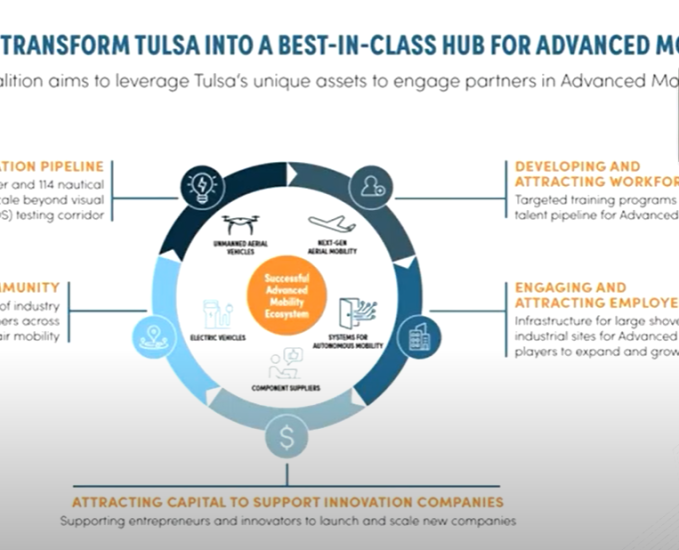The US Department of Commerce’s Economic Development Administration (EDA) has selected the Tulsa Regional Advanced Mobility (TRAM) Corridor led by the Indian Nations Council of Governments, as one of 21 winners of the USD1 billion Build Back Better Regional Challenge that aims to boost economic recovery from the pandemic and rebuild American communities. The TRAM Corridor is to receive USD39 million to transition the region from its legacy of oil and gas and traditional manufacturing to advanced mobility, automation, and unmanned aerial systems. Tulsa’s existing manufacturing base has been steadily eroding and workforce training programs have struggled to keep pace with technological change. EDA funding will invest in key assets, enabling the region to compete in a rapidly growing industry where no clear winner has yet emerged.
Oklahoma State University (OSU) will partner with the Osage Nation to stand up a 114-nautical mile “beyond visual line-of-sight” flight test range for advanced aerial mobility technologies. OSU will also establish the LaunchPad Research and Technology Centre in Tulsa’s Greenwood neighbourhood, the historic site of Black Wall Street, to increase research capacity for established firms and potential entrepreneurs. Partnerships with community and entrepreneurship support organizations that have deep ties to Greenwood’s Black residents such as Black Tech Street, will ensure equitable access to the Centre’s programmes.
“Oklahoma has a proud and longstanding history in aviation, aerial mobility technology, and manufacturing, which has allowed northeast Oklahoma to harness the region’s innovative capabilities and lead in the development of next-generation unmanned aerial systems,” said Congressman Frank Lucas (OK-03). “The Economic Development Administration’s USD39 million award is a welcome and exciting investment that will cement Oklahoma as a hub of transformational aerial mobility research and development. I commend the work of INCOG, Oklahoma State University, the Osage Nation, the City of Tulsa, and all other regional stakeholders who have forged a pioneering vision for the future of unmanned aerial technologies and manufacturing in Oklahoma. By investing in this critical industry, and our local and state economies, we will continue to increase America’s technological competitiveness across the globe.”
For more information visit:




